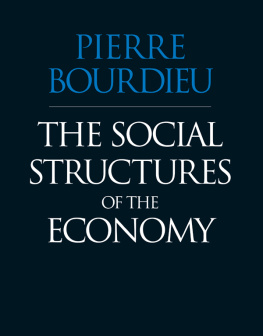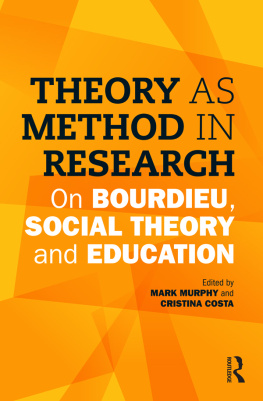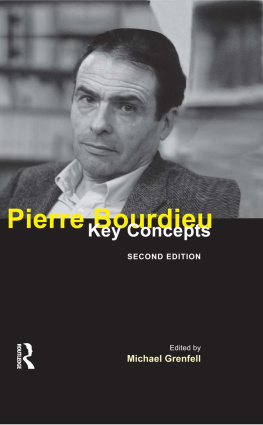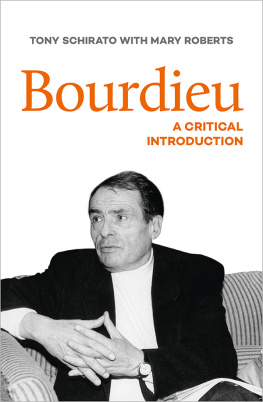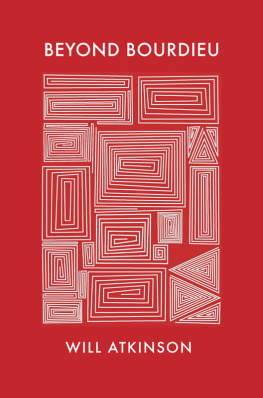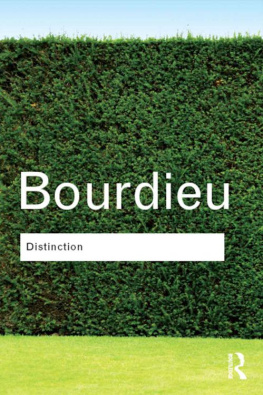
Outlines of a Theory of Plural Habitus
This book explores the thought of Pierre Bourdieu, one of the most influential sociologists of the 20th century, proposing a modification and extension of his concept of habitus. Building on Bourdieus notion of the translational reproduction of social structure the idea that while social classes move in the same direction, dominant groups are able to preserve their relative power position, thus maintaining the structure of the gap the author proposes that as social structures change, habitus change correspondingly and thus become plural. Informed by Norbert Elias process sociology, this volume offers examples of habitus pluralisation, arguing that this modification of Bourdieus thought renders it more suitable for the study of social changes and represents the development of a path that Bourdieu himself had begun to explore in the later stages of his career. As such, it will appeal to scholars of sociology and social theory with interests in historical sociology, process sociology, social structures, and the thought of Bourdieu.
Mikls Hadas is Professor of Sociology, former Head of the Culture and Communication Doctoral School, and co-founder of the Centre for Gender and Culture at Corvinus University of Budapest, Hungary.
Routledge Studies in Social and Political Thought
4 Functionalist Construction Work in Social Science
The Lost Heritage
Peter Sohlberg
5 Critical Theory and New Materialisms
Hartmut Rosa, Christoph Henning and Arthur Bueno
6 Max Webers Sociology of Civilizations: A Reconstruction
Stephen Kalberg
7 Temporal Regimes
Materiality, Politics, Technology
Felipe Torres
8 Citizenship in a Globalized World
Christine Hobden
9 The World as Idea
A Conceptual History
Charles P. Webel
10 Max Weber and the Path from Political Economy to Economic Sociology
Christopher Adair-Toteff
11 Outlines of a Theory of Plural Habitus
Bourdieu Revisited
Mikls Hadas
12 Marcel Gauchet and the Crisis of Democratic Politics
Edited by Natalie J. Doyle & Sean McMorrow
For a full list of titles in this series, please visit www.routledge.com/series/RSSPT
First published 2022
by Routledge
2 Park Square, Milton Park, Abingdon, Oxon OX14 4RN
and by Routledge
605 Third Avenue, New York, NY 10158
Routledge is an imprint of the Taylor & Francis Group, an informa business
2022 Mikls Hadas
The right of Mikls Hadas to be identified as author of this work has been asserted in accordance with sections 77 and 78 of the Copyright, Designs and Patents Act 1988.
All rights reserved. No part of this book may be reprinted or reproduced or utilised in any form or by any electronic, mechanical, or other means, now known or hereafter invented, including photocopying and recording, or in any information storage or retrieval system, without permission in writing from the publishers.
Trademark notice: Product or corporate names may be trademarks or registered trademarks, and are used only for identification and explanation without intent to infringe.
British Library Cataloguing-in-Publication Data
A catalogue record for this book is available from the British Library
Library of Congress Cataloging-in-Publication Data
A catalog record has been requested for this book
ISBN: 978-1-032-01705-1 (hbk)
ISBN: 978-1-032-01706-8 (pbk)
ISBN: 978-1-003-17970-2 (ebk)
DOI: 10.4324/9781003179702
Typeset in Times New Roman
by Apex CoVantage, LLC
I dedicate this book to Viktor Kardy, gratefully acknowledging his critical comments and suggestions.
Contents
1 The habitus concept in the Bourdieusian oeuvre
2 Approaches to changing habitus
3 The social construction of plural habitus: historical examples
4 Summary
- 1 The habitus concept in the Bourdieusian oeuvre
- 2 Approaches to changing habitus
- 3 The social construction of plural habitus: historical examples
- 4 Summary
Guide
Introduction
DOI: 10.4324/9781003179702-1
Our languages are constructed in such a way that we can often only express constant movement or constant change in ways which imply that it has the character of an isolated object at rest, and then, almost as an afterthought, adding a verb which expresses the fact that the thing with this character is now changing. For example, standing by a river we see the perpetual flowing of the water. But to grasp it conceptually, and communicate it to others, we do not think and say, Look at the perpetual flowing of the water, we say, Look how fast the river is flowing. We say, The wind is blowing, as if the wind were actually a thing at rest which, at a given point of time, begins to move and blow. We speak as if the wind were separate from its blowing, as if a wind could exist which did not blow.
(Norbert Elias 1978, 11112)
In November 1983, as a newly graduated sociologist, I spent one month in France. At the time, it was not easy to travel to the so-called Western countries from communist Hungary, as Hungarian citizens could make such a visit every three years only after the Interior Ministry had given permission to do so (which sometimes took months). My French orientation began at the age of 14 when I was accepted to a high school in downtown Budapest, where French was taught as a foreign language. This time, however, my journey was motivated not only by the desire of experiencing French culture first hand but also by a professional project. My backpack contained a translation of my university dissertation, which I deposited with Bourdieus secretary the day after I arrived in Paris, asking her to forward it to him. The title of the work was The Structure and Function of the Field of Pop Music. This was an essay on the Hungarian pop-rock music scene of the 1970s and 1980s, with a focus on the Bourdieusian field concept to reveal, first of all, how the constitution of the field (including its political control) contributed to the legitimisation of the regime.
There were only three days left from my 30-day visit when the secretary called me to say that Monsieur Bourdieu was expecting me the next day. (At that time, if a Hungarian citizen returning from a Western country exceeded the visa by even one day, s/he could expect his or her passport to be revoked for an indefinite time.) Bourdieu was extremely kind, interested, empathetic, and even enthusiastic; he told me that my thesis was very original and a book on the subject would make me known internationally. He also proposed to start my doctoral studies at the cole des Hautes tudes en Sciences Sociales under his tutelage. In retrospect, I am not sure that my dissertation, translated into a less-than-nuanced French, would have been that great. My warm reception was partly due to the fact that I came from a Soviet Bloc country and that my text was critical of the communist social order. My subject was rather unique, and my professional background may have also played a role, since few studies had been written by that time that applied Bourdieus conceptual framework to issues related to music.
I then spent two academic years under Bourdieus supervision. The world opened up to me: Instead of the narrow horizon of a semi-peripheral dictatorship, I had the opportunity to see the world from the vibrant perspective of a former colonial great power. At the same time, identifying with the position of the oppressed, I also developed a particular receptivity to the Algerian, Vietnamese, or Guadeloupean point of view. I was fascinated to read and listen to stories of skeletons falling out of the cupboard of French national memory, an interest connected with the self-reflexive spirit of Bourdieu and his surroundings. Meanwhile, I lapped up the unparalleled abundance of culture, science, and everyday life, from Peter Brooks


